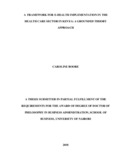| dc.description.abstract | Information and Communication Technology (ICT) has turned into a key enabling tool in the enhanced healthcare delivery and has impacted how we live and see the world. The implementation of Information Technology (IT) and particularly e-health is, seen as a potential tool in enhancing healthcare delivery. The purpose of this thesis was to develop a holistic framework that addresses e-health implementation in developing countries. The existing frameworks for e-health implementation in developing countries are not holistic and only address few aspects of e-health implementation. Basically the frameworks that are in place may not work in the context for many developing countries for the implementation of e-health systems. Moreover the frameworks have also been developed mainly using secondary data. In addition they have been developed based on positivist approach that forces certain preconceptions unlike grounded theory approach that allows for theory to emerge from data. The inadequacy of the existing frameworks necessitated a different approach towards healthcare research. Thus there was a case for developing a holistic framework that is grounded from empirical data. This was addressed by using grounded theory approach to develop a data driven framework for implementation of e-health systems in the healthcare sector in Kenya. The study used a paradigmatic stance of pragmatism and grounded theory methodology. Theoretical sampling was used to interview a total number of 30 respondents. NVivo software version 11 was used for the analysis of the data. The data analysis was done using three levels of coding namely open, axial and selective. Thirteen categories emerged from the three stages of coding. The thirteen categories were further combined to form five main categories. The findings of the study generated a data driven framework that explains implementation of e-health in Kenya consisting of five categories namely political e-readiness, managerial practices, IS Capability, societal e-readiness and regulatory framework. The implications of the study were that it developed a data driven theory rather than testing theory. The theory presented was done from theory building approach with a pragmatism paradigm. This is a major departure from the common practise of theory testing and surveys in IS research. Therefore this can be used as a point of reference for Kenyan researchers that may wish to utilise theory building approach. The theory developed is a substantive theory for e-health implementation which can be in future developed into a formal theory. In addition for developing countries such an approach would be preferable due to the complex context and nature of problems. A reductionist approach cannot effectively address such complex contexts. The model is holistic and presents categories that the Government may find helpful in addressing the e-health implementation challenges as well as improve on the national e-health strategy. Similarly the IS professionals can use the findings to improve their professional practise in healthcare research. In conclusion the study generated three other new themes not addressed in the existing frameworks. Thus there is a need to change focus from the current technological bias in e-health implementation and address other non technological issues. | en_US |

